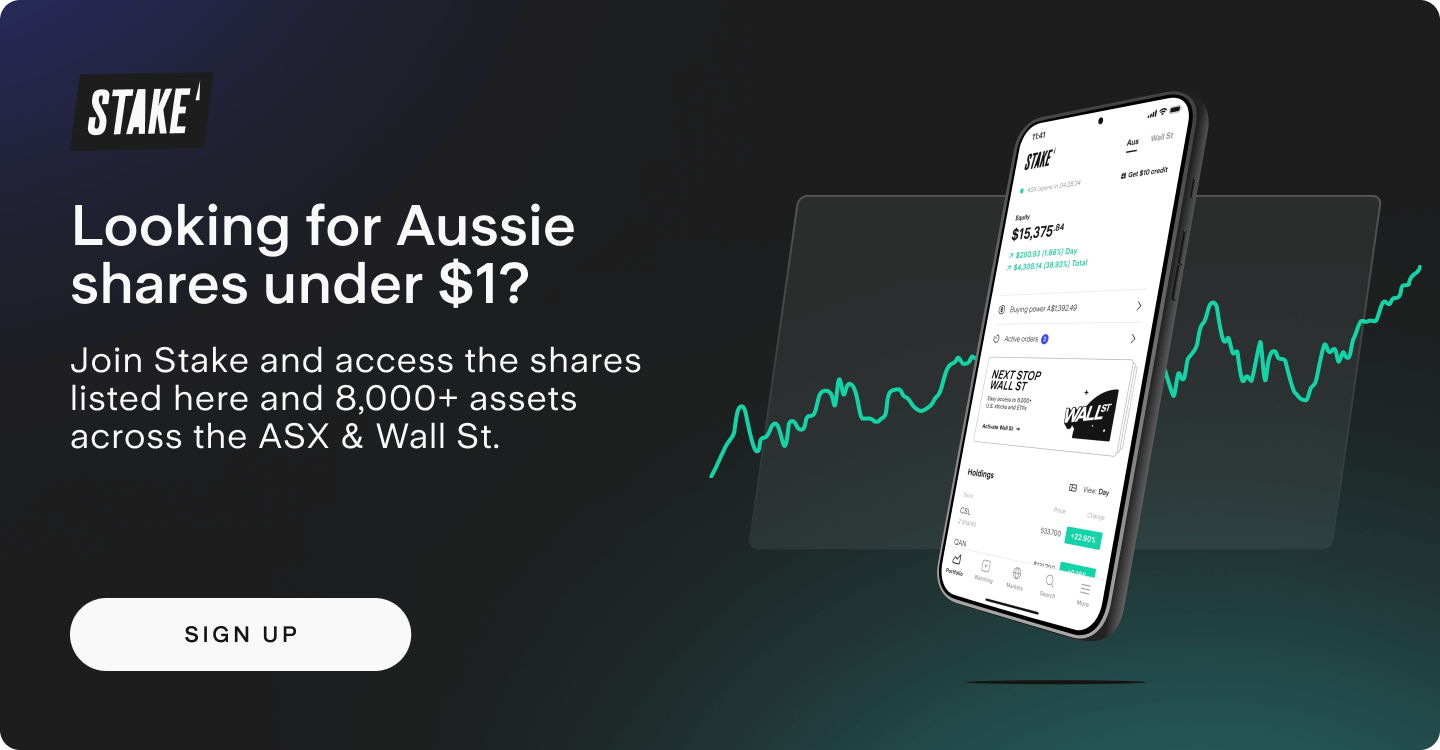
Penny stocks on ASX: Are these the best Australian shares under $1?
Penny stocks are shares of smaller companies that trade for less than $1. There are plenty of potential investment opportunities in penny stocks in Australia. These types of companies have relatively few sellers but sometimes there is enough buyer demand in these highly speculative investments.
Are these the best penny stocks on the ASX?
Company Name | Ticker | Stock Price | Year to Date | Market Capitalisation |
|---|---|---|---|---|
BrainChip Holdings | $0.16 | -78.00% | $320m | |
Ardent Leisure Group | $0.45 | -25.00% | $221m | |
Tesserent | $0.13 | +8.33% | $176m | |
Bubs Australia | $0.16 | -46.67% | $128m | |
Airtasker | $0.19 | -45.83% | $88m | |
Adore Beauty Group | $0.71 | -30.58% | $70m | |
Carbon Revolution | $0.13 | -7.14% | $29m | |
AML3D Limited | $0.09 | +28.57% | $20m | |
Minrex Resources | $0.014 | -53.33% | $15m | |
Castle Minerals Limited | $0.01 | -50.00% | $11m |
Data as of 4 October 2023. Sources: Stake, Google Finance.
*The list of stocks mentioned is ranked by market cap. When deciding what stocks to feature, we analyse the financials, recent news, the state of the industry, and whether or not they are actively traded on Stake.

Discover our list of Australian shares under $1
1. BrainChip Holdings ($BRN)
Market Capitalisation: $320m
Stock price (as of 04/10/2023): $0.16
Stake Platform Bought / Sold (1 Jan 2023 - 4 October 2023): 61% / 39%
Brainchip Holdings ($BRN) is a company that specialises in researching and developing both software and hardware for AI and machine learning applications. It made headlines in 2021 with its share price growth from just $0.05 to almost $1.50, most likely due to its long-time development project, the Akida AI Processor, finally reaching commercialisation. Since then, Brainchip has been busy growing its business network, partnering with companies such as NVISO, MegaChips and emotion3D.
While its share price has fallen since 2021, Brainchip's revenue has improved significantly in the last year. Despite this, the company is yet to record profits, and analysts expect the company to be loss-making until at least 2024.
Investors need to be wary when choosing to invest in this company, as Brainchip has been regularly issuing new shares to raise more capital – diluting the holdings of existing shareholders.
Check out our Under the Spotlight on BrainChip to learn more about the company or find similar companies in our list of 10 artificial intelligence stocks on the Australian Securities Exchange.
2. Ardent Leisure Group ($ALG)
Market Capitalisation: $221m
Stock price (as of 04/10/2023): $0.45
Stake Platform Bought / Sold (1 Jan 2023 - 4 October 2023): 67% / 33%
If you've ever been to Dreamworld or Whitewater World in Queensland, you would've been a customer of Ardent Leisure Group ($ALG). Having an extremely long history as a company, Ardent Leisure has gone through several name changes, was delisted and relisted into the ASX, and had several acquisitions and demergers. In the last few years, Ardent Leisure has sold off several of its segments in order to focus its operations on its existing theme parks. Additionally, the company used to record revenues in the hundreds of millions, but in the last two years recorded less than $50m.
While Ardent Leisure seems to look like a shell of its past, the last few years have been marked by lockdowns and limited tourism. Analysts expect the company to bounce back by 2024. For now, the company's shares have equally suffered, being at their lowest since the company relisted on the ASX in 2018.
3. Tesserent ($TNT)
Market Capitalisation: $176m
Stock price (as of 04/10/2023): $0.13
Stake Platform Bought / Sold (1 Jan 2023 - 4 October 2023): 55% / 45%
Tesserent ($TNT) is the largest publicly-listed cybersecurity company in Australia, offering services to both commercial and governmental institutions. The company is also an educational provider of cybersecurity skills, under their arm called Tesserent Academy. Incorporated only in 2015, Tesserent has grown to become a company with over 300 employees and has increased its revenues from approximately A$5m in 2018 to A$131m in 2022. The company also spent the last two years acquiring smaller companies.
While the company has experienced steadily growing revenues, it has recorded small net losses since 2016. Fortunately, these losses were mainly due to high non-operating expenses such as changes in asset fair values, share-based payments, refinancing costs, and other corporate costs, which are generally non-recurring expenses. Only one analyst currently covers the stock and has a bullish outlook on its growth over the next few years.
4. Bubs Australia ($BUB)
Market Capitalisation: $128m
Stock price (as of 04/10/2023): $0.16
Stake Platform Bought / Sold (1 Jan 2023 - 4 October 2023): 61% / 39%
Anyone who has been following global news would be well aware of the existing infant formula shortage plaguing the U.S., China, and several other countries. Thanks to this, Bubs Australia ($BUB) was able to receive fast-tracked approval from the U.S. FDA last year and began distributing products in major retailers including Walmart and Target. The company was also able to penetrate the Chinese market through partnerships with local retailers. These developments saw revenues grow by almost 300% in the year ending 2022, with the highest growth in its China and international market segments.
The $BUB share price is currently sitting towards the 52-week low at $0.16. With its latest FY23 results showing a drop in revenue, investors may still be optimistic with Bubs Australia expecting to be cash flow positive by FY25.
5. Airtasker ($ART)
Market Capitalisation: $88m
Stock price (as of 04/10/2023): $0.19
Stake Platform Bought / Sold (1 Jan 2023 - 4 October 2023): 71% / 29%
Another tech company with a fairly recent IPO, Airtasker ($ART) operates a platform that works as an online marketplace for household services such as cleaning, home maintenance, logistics, assembly, and several others. Having had its IPO at $0.65, Airtasker's current share price decline has been largely due to the broader market pessimism, given that the company's revenues have been steadily growing, and it has also completed a few acquisitions to expand its reach globally.
It is important to note, however, that despite increasing revenues, Airtasker has still been operating at a net loss. The company's main pain point would be the cost of earning its revenues – almost 80% of the company's total revenues are paid out to contractors. This leaves a small gross profit margin (20.71% for 2022), and not much room for the company's other operating expenses; thus leading to losses at year-end. Unless Airtasker can find a way to widen its profit margins or lessen its operating expenses, the company's fundamentals may continue to suffer.
6. Adore Beauty Group ($ABY)
Market Capitalisation: $70m
Stock price (as of 04/10/2023): $0.71
Stake Platform Bought / Sold (1 Jan 2023 - 4 October 2023): 49% / 51%
Established in 2000 and publicly listed in 2020, Adore Beauty ($ABY) has become a household e-commerce name for those interested in beauty, skincare and makeup items. Its IPO raised just shy of $250m, but its share price has seen a decline since then – in line with the tech stock correction experienced by most other e-commerce companies on the ASX. Since its IPO, there has not been much notable news on Adore Beauty, with it mainly operating business as usual.
While its share price has suffered in the last two years, its financials have improved and experienced strong and fast growth – with its revenues growing approximately 175% from 2020 to 2022, and its net income moving from a loss of $825k to a $1.7m profit over the same time frame.
With the slowing economic conditions, however, analysts expect Adore Beauty to revert back to a small loss this year, before going back to profits in 2024.
7. Carbon Revolution ($CBR)
Market Capitalisation: $29m
Stock price (as of 04/10/2023): $0.13
Stake Platform Bought / Sold (1 Jan 2023 - 4 October 2023): 48% / 52%
Carbon Revolution ($CBR) designs and manufactures carbon fibre wheels for vehicles. The company's products are used in different types of vehicles, including industrial, electric and motorsports vehicles and it supplies to different manufacturers worldwide.
Its most recent notable partnership was with Chevrolet ($GM) earlier this year, where CBR's wheels would be used for the 2024 Chevrolet Corvette E-Ray. Carbon Revolution has been increasing revenues consistently in the last few years, however, it has not yet recorded net income.
Last November, Carbon Revolution announced an impending merger with Twin Ridge Capital Acquisition Corp ($TRCA) and is in the process of delisting from the ASX and relisting on Wall Street. The merger transaction is expected to complete in the next financial year for a total value of US$200m. Shareholders of CBR would then be receiving one share of the merged company for every 10.5 shares of CBR. Given that its share price has been in decline since 2019, investors might find an opportunity in this development.
8. AML3D Limited ($AL3)
Market Capitalisation: $20m
Stock price (as of 04/10/2023): $0.09
Stake Platform Bought / Sold (1 Jan 2023 - 4 October 2023): 56% / 44%
For investors interested in the 3D-printing space, AML3D ($AL3) is one to add to the watchlist. The company engages in contract manufacturing for customers including the U.S. Defence Force, Boeing ($BA), ExxonMobil ($XOM) and Chevron ($CVX), producing metal components and structures for their use. Having its IPO just three years ago, AML3D is still in its growth stage, focusing on patenting its technology and acquiring new customers.
While its IPO was priced at $0.20 per share, its share price has suffered heavily since then, hitting a low of $0.052 in the last year. Despite this downward price movement, it has grown its revenues from $482k in 2021 to $1.46m in 2022. While still operating at a net loss, its growing number of contracts may possibly turn this around in the near future.
9. MinRex Resources ($MRR)
Market Capitalisation: $15m
Stock price (as of 04/10/2023): $0.014
Stake Platform Bought / Sold (1 Jan 2023 - 4 October 2023): 61% / 39%
Another Australian miner on this list, MinRex Resources ($MRR) holds interest in gold, silver and copper mining projects across Western Australia and New South Wales. Since its IPO in 2011, the company experienced wide fluctuations in share price until 2018 – from a low of $0.04 then to a high of $0.22. Currently, its share price is only a shell of its past, trending between $0.014 and $0.068 in the last year.
Despite being on the ASX stock market for over a decade, MinRex is still in pre-operational stage, relying on equity capital raises to increase its cash balance and to continue operating. Over the years, however, it has grown to own interests in several more development projects, even extending to lithium. At present, it has not yet provided guidance on when it will start generating revenues.
💡Related: Copper mining companies on the ASX→
10. Castle Minerals Limited ($CDT)
Market Capitalisation: $11m
Stock price (as of 04/10/2023): $0.01
Stake Platform Bought / Sold (1 Jan 2023 - 4 October 2023): 56% / 44%
Castle Minerals ($CDT) is a mining company based in Western Australia that engages in exploration for gold, lithium, graphite and a few other base minerals. The company holds interests in several projects within Western Australia and a few in Africa, with most of them mainly gold projects. The company was founded back in 2005 and has spent the majority of its time taking ownership of new projects.
Over the years, auditors have raised growing concerns about Castle Minerals' financial situation, with its last one in September 2022. Despite that, the company has continued to operate thanks to investors continually injecting new capital through equity offerings. At present, there is unfortunately still no estimate on when Castle Minerals will finally move on from its pre-operational stage. Castle Minerals would definitely be one of the higher-risk companies in this list.
💡Related: Top 10 Gold mining companies on ASX→
💡Related: ASX Lithium shares to watch→
How to buy penny stocks in Australia
The main way of investing in penny stocks is through an online investment platform like Stake.
1. Open a stock investing account
To invest in ASX shares under $1, you'll need to sign up to an investing platform with access to the ASX and Cboe Australia. Lucky for you Stake has access to both stock exchanges.
2. Fund your account
Complete an application with your personal and financial details. Fund your account with a bank transfer, debit card or even Apple/Google Pay.
3. Search for the penny stock you like or Australian shares under $1
Find the asset by searching for the name or ticker symbol. Do your own research to ensure it is the right investment product for your own circumstances.
4. Choose an order type and buy the asset
Buy on any trading day with a market, limit or stop order. Look into dollar cost averaging to spread out your risk, which smooths out buying at consistent intervals.
5. Monitor your investment
Optimise your portfolio by tracking how the security performs with an eye on the long term. You may be eligible for dividends and shareholder voting rights that affect your shares.
Looking to invest in penny stocks?
Join Stake and access small cap securities along with 8,000+ other market opportunities across the ASX & Wall St.
What to look for when investing in micro-cap stocks?
Investing in micro-cap stocks requires thorough research and caution due to their high risk profile. When evaluating these stocks, it's essential to assess the company's fundamentals – such as financial statements, revenue growth, profitability, and debt levels. Additionally, analysing the company's macroeconomic landscape is crucial.
Evaluating the company's management team and business model is also important.
Furthermore, consider the risks involved, such as liquidity risk and increased volatility, and stay updated on news and events that could impact the stock price. Ultimately, investing in micro-cap stocks requires careful analysis and a long-term perspective that allows for volatility and risk tolerance.
More resources:
✅ 10 Value stocks on the ASX worth watching→
✅ Are these the best ASX growth stocks?→
✅ Discover these defensive shares to protect your portfolio→
Penny stocks FAQs
Penny stocks, also known as penny shares, are stocks that trade at a very low price per share. For this article, we have chosen Australian shares under $1.
The term "penny stock" came about because penny stocks used to be securities that were traded for only a few cents. This term has been expanded to include small-cap stocks that have shares priced at a dollar, or even a few dollars. The U.S. Securities and Exchange Commission (SEC) has in fact modified its definition of penny stocks to include all shares under $5.
Penny stocks typically belong to small, early-stage companies with a relatively low market capitalisation. They are often characterised by high volatility, limited liquidity, and a higher degree of risk compared to larger, more established stocks.
While there is no set definition for how small of a market cap a company should have in order to be considered a penny stock, the ones on this list are limited to a market cap of up to $1b.
Penny shares are generally considered to be high-risk investments due to their likelihood of being extremely volatile and being shares of young companies that are not yet well-established in their respective industries. While some of the best penny stocks have had significant investment outperformance compared to investments in larger companies, several others have also resulted in substantial losses for investors.
Choosing to buy penny stocks is not for all retail investors, and investors looking to do so would benefit from doing their own research by delving into a company's income statement and balance sheet to make sure the company can weather through all market conditions.
Additionally, penny stocks are prone to speculation, and some of them see extreme increases in share price growth. When this happens, investors must remember that past performance is not a guarantee of future performance and that decisions made on emotions must be avoided.
The top five most-traded U.S. penny stocks on Stake so far in 2023 are Mullen Automotive ($MULN), Arrival Group ($ARVL), Powerbridge Technologies ($PBTS), EUDA Health Holdings ($EUDAW) and Electra Meccanica Vehicles ($SOLO).
On Stake, ASX stocks, specifically ASX penny stocks, are traded much more than U.S. penny stocks.
There are a few risks involved with investing in penny shares. Most penny shares can experience rapid price fluctuations in short periods. This volatility can present opportunities for quick gains but also exposes investors to substantial losses. Penny stocks are often thinly traded, leading to low liquidity, wider bid-ask spreads, and potential challenges in executing trades at desired prices.
Another factor to consider is the limited information available for micro-cap companies. These smaller, often early-stage companies typically have less public information compared to larger, more established companies. This lack of information increases investment risk and makes it harder for investors to make informed decisions about the company's operations.
Lastly, penny shares are considered to be high-risk investments due to the nature of the companies involved. Many micro-cap companies are small, unproven, or facing financial difficulties. They may have untested business models, inadequate management teams, or uncertain revenue streams. Investing in such companies can be highly speculative, and the risk of losing invested capital is greater compared to investing in larger, more established companies.
This does not constitute financial product advice nor a recommendation to invest in the securities listed. Past performance is not a reliable indicator of future performance. As always, do your own research and consider seeking appropriate financial or taxation advice before investing.

Megan is a markets analyst at Stake, with 7 years of experience in the world of investing and a Master’s degree in Business and Economics from The University of Sydney Business School. Megan has extensive knowledge of the UK markets, working as an analyst at ARCH Emerging Markets - a UK investment advisory platform focused on private equity. Previously she also worked as an analyst at Australian robo advisor Stockspot, where she researched ASX listed equities and helped construct the company's portfolios.

